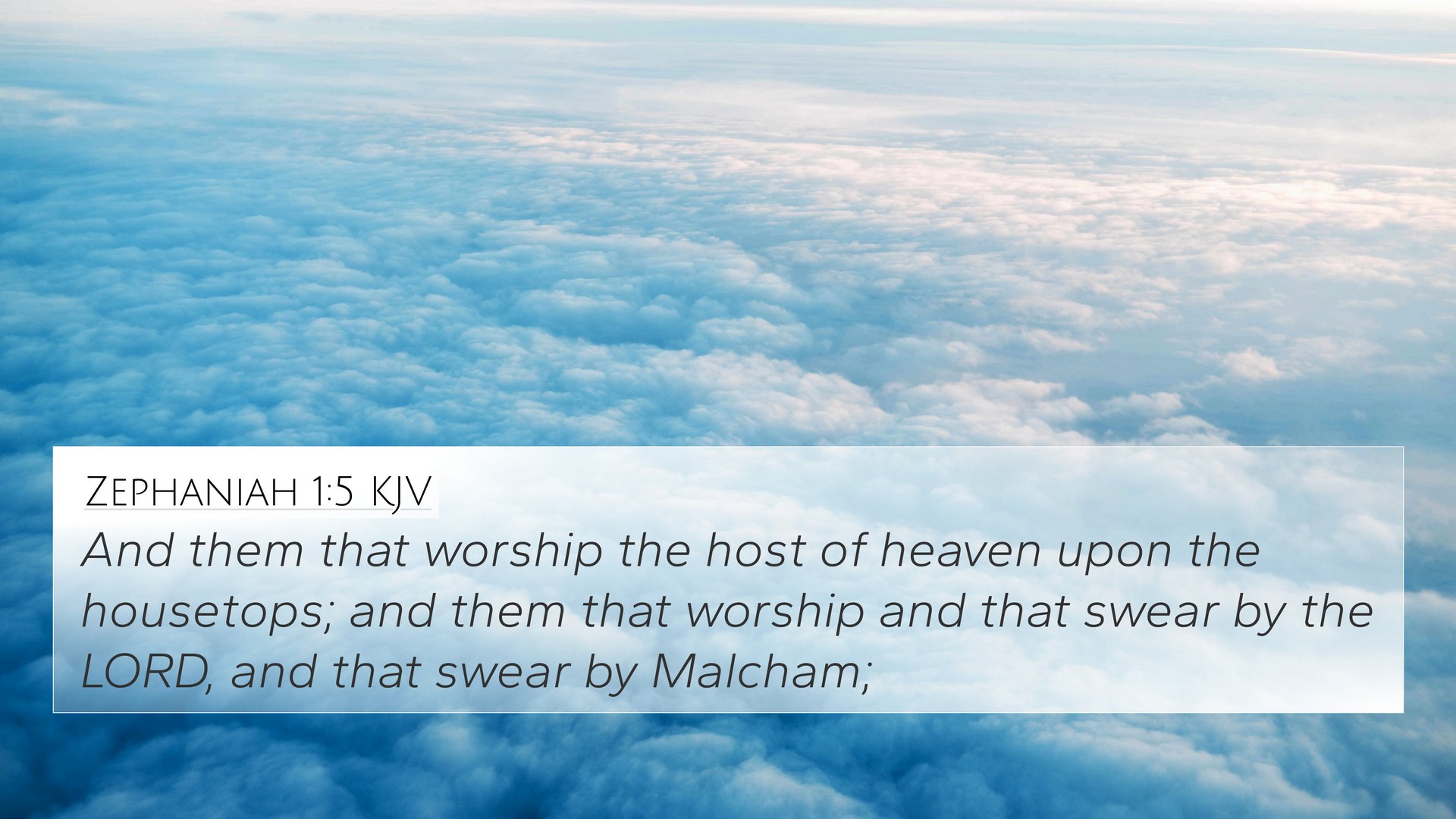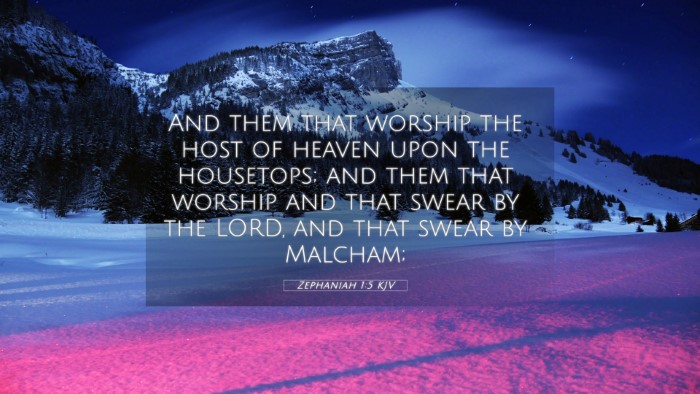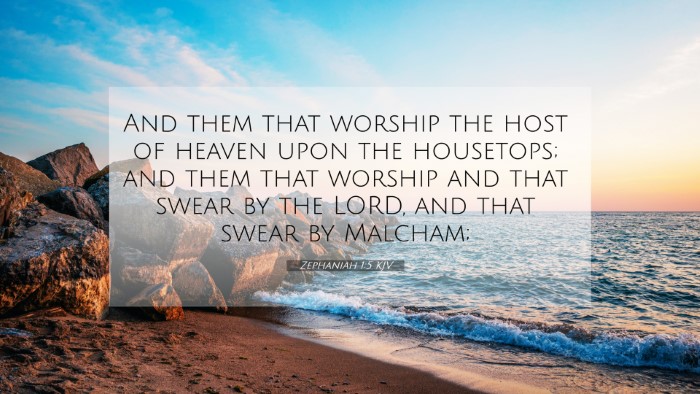Old Testament
Genesis Exodus Leviticus Numbers Deuteronomy Joshua Judges Ruth 1 Samuel 2 Samuel 1 Kings 2 Kings 1 Chronicles 2 Chronicles Ezra Nehemiah Esther Job Psalms Proverbs Ecclesiastes Song of Solomon Isaiah Jeremiah Lamentations Ezekiel Daniel Hosea Joel Amos Obadiah Jonah Micah Nahum Habakkuk Zephaniah Haggai Zechariah MalachiZephaniah 1:5 Similar Verses
Zephaniah 1:5 Cross References
And them that worship the host of heaven upon the housetops; and them that worship and that swear by the LORD, and that swear by Malcham;
Uncover the Rich Themes and Topics of This Bible Verse
Listed below are the Bible themes associated with Zephaniah 1:5. We invite you to explore each theme to gain deeper insights into the Scriptures.
Zephaniah 1:5 Cross Reference Verses
This section features a detailed cross-reference designed to enrich your understanding of the Scriptures. Below, you will find carefully selected verses that echo the themes and teachings related to Zephaniah 1:5 KJV. Click on any image to explore detailed analyses of related Bible verses and uncover deeper theological insights.

1 Kings 11:33 (KJV) »
Because that they have forsaken me, and have worshipped Ashtoreth the goddess of the Zidonians, Chemosh the god of the Moabites, and Milcom the god of the children of Ammon, and have not walked in my ways, to do that which is right in mine eyes, and to keep my statutes and my judgments, as did David his father.
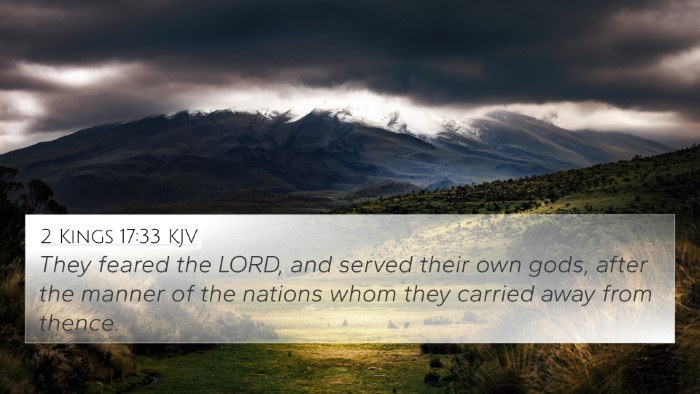
2 Kings 17:33 (KJV) »
They feared the LORD, and served their own gods, after the manner of the nations whom they carried away from thence.

Jeremiah 19:13 (KJV) »
And the houses of Jerusalem, and the houses of the kings of Judah, shall be defiled as the place of Tophet, because of all the houses upon whose roofs they have burned incense unto all the host of heaven, and have poured out drink offerings unto other gods.
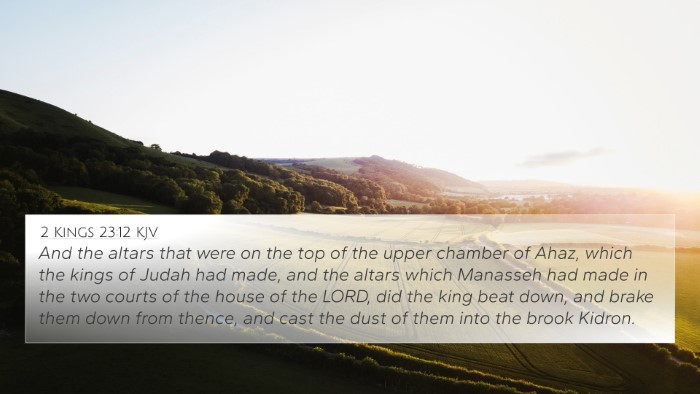
2 Kings 23:12 (KJV) »
And the altars that were on the top of the upper chamber of Ahaz, which the kings of Judah had made, and the altars which Manasseh had made in the two courts of the house of the LORD, did the king beat down, and brake them down from thence, and cast the dust of them into the brook Kidron.
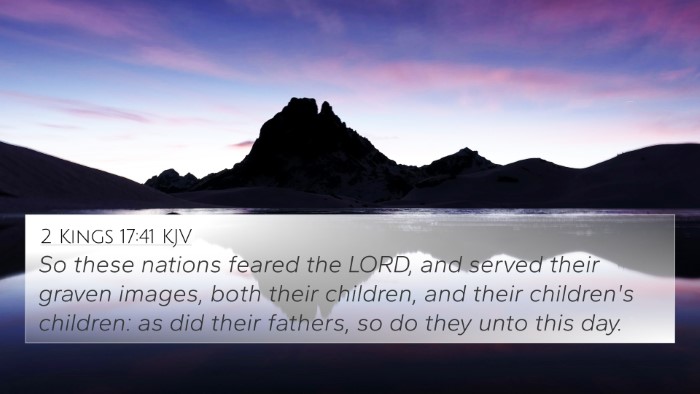
2 Kings 17:41 (KJV) »
So these nations feared the LORD, and served their graven images, both their children, and their children's children: as did their fathers, so do they unto this day.
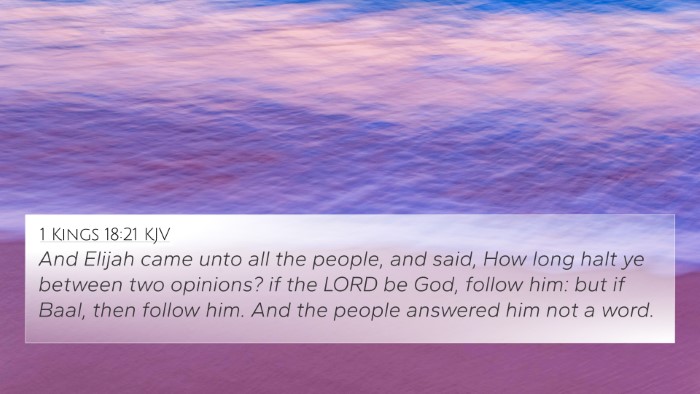
1 Kings 18:21 (KJV) »
And Elijah came unto all the people, and said, How long halt ye between two opinions? if the LORD be God, follow him: but if Baal, then follow him. And the people answered him not a word.

Amos 5:26 (KJV) »
But ye have borne the tabernacle of your Moloch and Chiun your images, the star of your god, which ye made to yourselves.
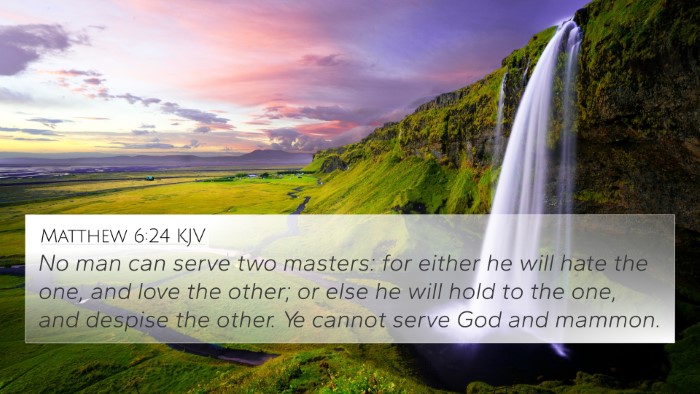
Matthew 6:24 (KJV) »
No man can serve two masters: for either he will hate the one, and love the other; or else he will hold to the one, and despise the other. Ye cannot serve God and mammon.
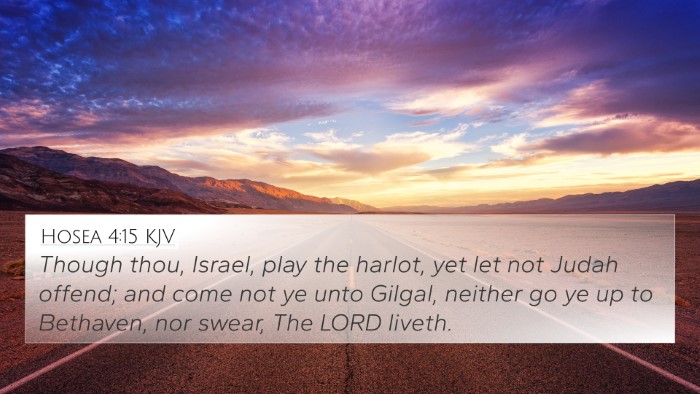
Hosea 4:15 (KJV) »
Though thou, Israel, play the harlot, yet let not Judah offend; and come not ye unto Gilgal, neither go ye up to Bethaven, nor swear, The LORD liveth.
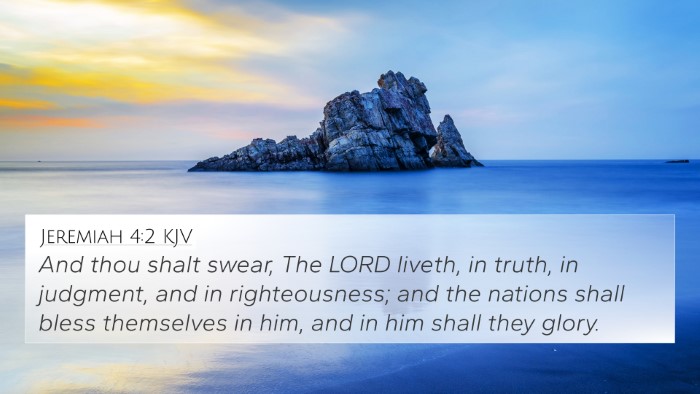
Jeremiah 4:2 (KJV) »
And thou shalt swear, The LORD liveth, in truth, in judgment, and in righteousness; and the nations shall bless themselves in him, and in him shall they glory.
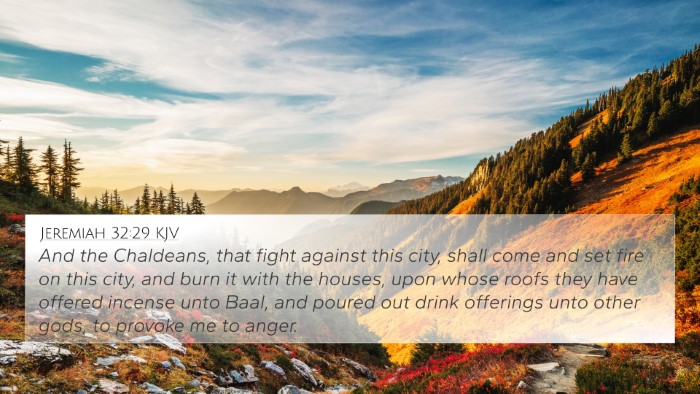
Jeremiah 32:29 (KJV) »
And the Chaldeans, that fight against this city, shall come and set fire on this city, and burn it with the houses, upon whose roofs they have offered incense unto Baal, and poured out drink offerings unto other gods, to provoke me to anger.
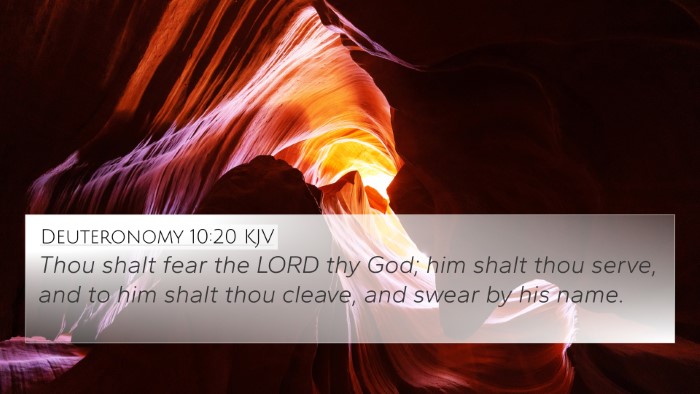
Deuteronomy 10:20 (KJV) »
Thou shalt fear the LORD thy God; him shalt thou serve, and to him shalt thou cleave, and swear by his name.
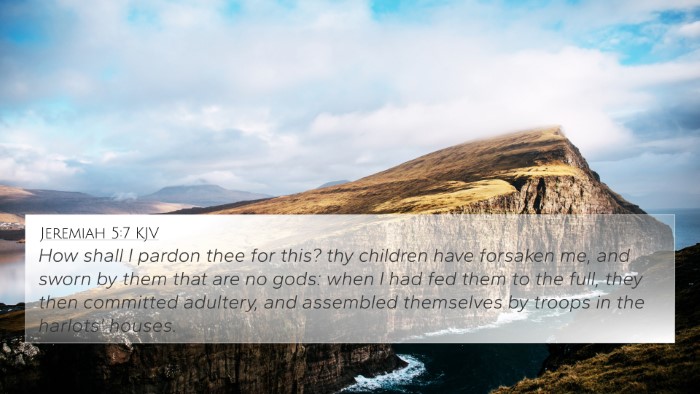
Jeremiah 5:7 (KJV) »
How shall I pardon thee for this? thy children have forsaken me, and sworn by them that are no gods: when I had fed them to the full, they then committed adultery, and assembled themselves by troops in the harlots' houses.
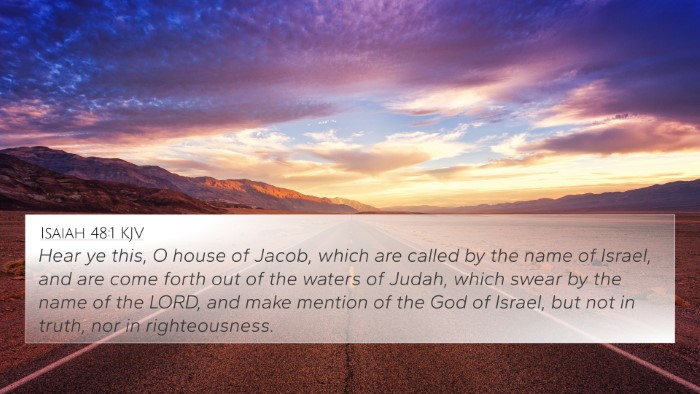
Isaiah 48:1 (KJV) »
Hear ye this, O house of Jacob, which are called by the name of Israel, and are come forth out of the waters of Judah, which swear by the name of the LORD, and make mention of the God of Israel, but not in truth, nor in righteousness.
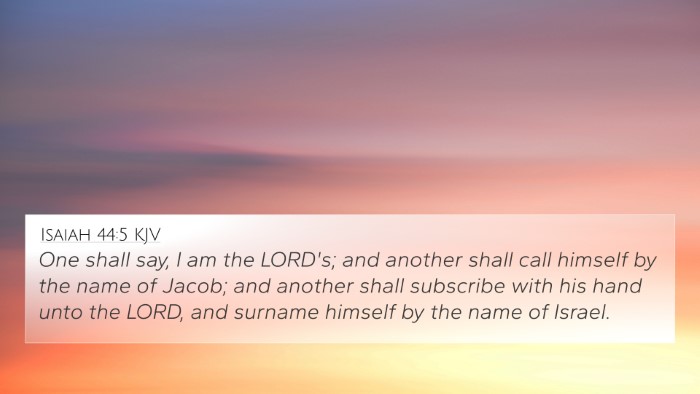
Isaiah 44:5 (KJV) »
One shall say, I am the LORD's; and another shall call himself by the name of Jacob; and another shall subscribe with his hand unto the LORD, and surname himself by the name of Israel.
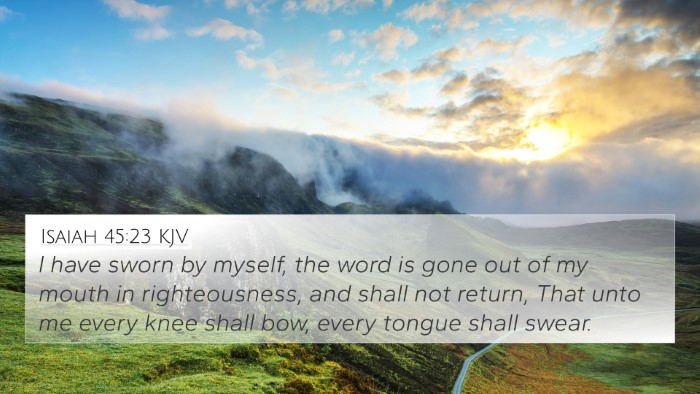
Isaiah 45:23 (KJV) »
I have sworn by myself, the word is gone out of my mouth in righteousness, and shall not return, That unto me every knee shall bow, every tongue shall swear.
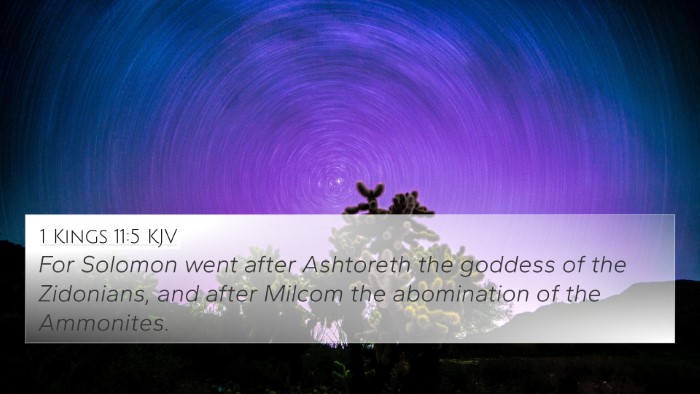
1 Kings 11:5 (KJV) »
For Solomon went after Ashtoreth the goddess of the Zidonians, and after Milcom the abomination of the Ammonites.
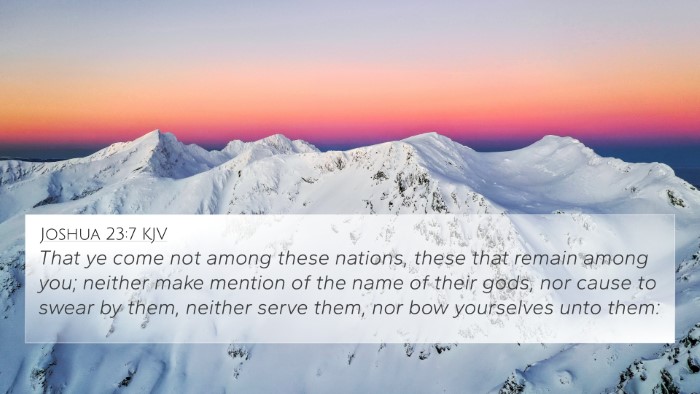
Joshua 23:7 (KJV) »
That ye come not among these nations, these that remain among you; neither make mention of the name of their gods, nor cause to swear by them, neither serve them, nor bow yourselves unto them:
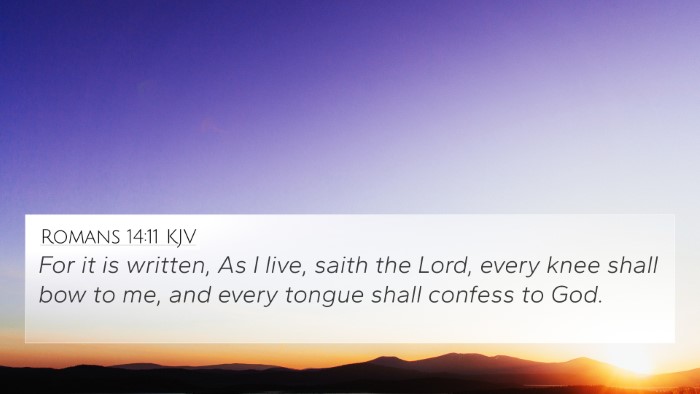
Romans 14:11 (KJV) »
For it is written, As I live, saith the Lord, every knee shall bow to me, and every tongue shall confess to God.
Zephaniah 1:5 Verse Analysis and Similar Verses
Understanding Zephaniah 1:5
Zephaniah 1:5 states, "And them that worship the host of heaven upon the housetops; and them that worship and that swear by the Lord, and that swear by Malcham."
Meaning of Zephaniah 1:5
This verse addresses the issues of idolatry and mixed worship prevalent in Judah during the prophet Zephaniah's time. The worship of the "host of heaven" refers to the practice of venerating celestial bodies, such as the sun, moon, and stars, which was a common practice among surrounding nations. The mention of swearing by both the Lord and Malcham—likely a reference to a false god—highlights the syncretism that had infiltrated the faith of the people.
Commentary Insights
Matthew Henry: Henry emphasizes the folly of combining true worship with idolatrous practices. He notes that the people were attempting to serve both God and idols, neglecting the exclusive devotion that God demands. This dual allegiance leads to spiritual corruption and judgment.
Albert Barnes: Barnes elaborates that the phrase "upon the housetops" implies a public display of worship, indicating a boldness in idolatry that visibly defies God's commandments. This verse serves as a warning about the consequences of such blatant idolatry, which would lead to divine judgment.
Adam Clarke: Clarke provides a historical context, suggesting that the references to worship practices reflect the larger societal issues of the day. He mentions that swearing by Malcham, often interpreted as a form of Baal worship, indicates the deep-seated corruption within the hearts of the people.
Bible Cross-References
To enhance understanding of Zephaniah 1:5, consider these relevant Bible verses that connect through themes of idolatry and worship:
- Deuteronomy 4:19 - Warns against worshipping the sun, moon, and stars.
- 2 Kings 23:5 - Details King Josiah's reforms including the removal of idol worship.
- Isaiah 47:13 - Critique of astrologers and stargazers.
- Jeremiah 7:18 - Mention of the Queen of Heaven worship, linking to divine judgment.
- Ezekiel 8:16 - Describes idol worship practices in the temple, showcasing the depth of the issue.
- Amos 5:26 - Rejects the worship of idols while recalling the Israelites' history of rebellion.
- Acts 7:43 - References the worship of Moloch, similar to Malcham, in the OT context.
Connecting Verses and Themes
The thematic connections between these verses highlight the dangers of syncretism in worship, a recurring issue throughout Scripture. Zephaniah’s focus on judgment serves as a crucial reminder of God's call for purity in worship. These cross-references also demonstrate the transition from the Old Testament prophecies to New Testament fulfillments where Jesus reaffirms the need for undivided devotion to God.
Conclusion
In studying Zephaniah 1:5, it becomes clear that God desires a faithful people who worship Him alone. This verse serves not only as a historical warning but also as a timeless call to assess our own allegiances in worship. As believers explore these connections between scriptures through tools like a Bible cross-reference guide, they can gain deeper insights into the implications of mixed worship and the importance of spiritual fidelity.
